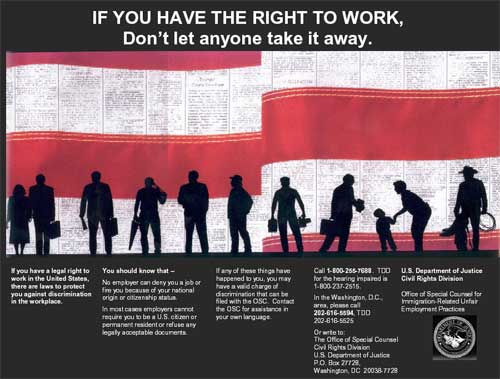Damned if You Do, Damned if You Don't... Hell, Damned if You Try To Run Any Kind of Business at All
Arizona state law now requires that employers use the federal e-verify system to screen employees for legal immigrant status. As I mentioned earlier, state law requires that I use this system in ways that are illegal under federal rules, at the risk of losing my business license.
Right now, I am going through a 6000 screen required tutorial that I have to endure before I can use a system that requires me to fill in about 3 blanks and hit enter. (Of course, since this is a government system, the tutorial has already crashed twice three five times and I have had to restart it each time). Somewhere in the midst of the training, I reach this admonition:
You may not discriminate against applicants and employees based upon
their citizenship or immigration status with respect to hiring, firing,
or recruitment or referral for a fee. This includes treating citizens
and non-citizens differently during the hiring process, such as
screening out non-citizens or not hiring lawful immigrants based upon
their immigration status.
WHAT? Personally, I am all for living by this, but isn't this EXACTLY what the law is requiring me to do? To discriminate against people, and ban my hiring of them, based on their immigration status? How can I possibly keep my actions legal if I am required to discriminate based on citizenship status but I am also banned from discriminating in hiring based on citizenship status. How Orwellian can we get?
To continue the Orwellian theme, as part of this law by the state of Arizona whose sole purpose is to restrict the classes of people I can and can't hire, I must display this poster:
Gee, I would have thought everyone in the world had the right to seek work and to contract with anyone they please for their labor, but in fact the only body taking away the right is the group that made this poster -- ie the government -- which requires that everyone have a special government license called citizenship or a green card before they can sell their labor to willing parties in this country.
Well I wondered, of course, why there were 176 (I counted) training screens just to enter name-social-DOB and hit return. It turns out that by "agreeing" to join the e-Verify program, which I am forced to do by Arizona law, I have agreed to become a US immigration officer and to do their job for them (without compensation, of course). Here is an example screen:
There are five options for resolving a case:
- Resolved Authorized. Select this option when employment is authorized.
- Resolved Unauthorized/Terminated. Select this option when
employment is not authorized (SSA Final Nonconfirmation, DHS Employment
Unauthorized, or DHS No Show), or when a Tentative Nonconfirmation
response is uncontested AND employment is terminated.- Self Terminated. Select this option if an employee quits or
is terminated for reasons unrelated to employment eligibility status
while the verification query is in process.- Invalid Query. Select this option if a duplicate query was discovered after the query was sent or if a query was sent with incorrect data.
- Employee Not Terminated. Select this option to notify DHS
that you are not terminating an employee who received an SSA Final
Nonconfirmation, DHS Employment Unauthorized, or DHS No Show response
or who is not contesting a Tentative Nonconfirmation response.
Got that?
Every campaign year we get these debates with all of these stupid questions, including things like "do you know how much a gallon of milk costs" or "Who is the head of state of Mayanmar?" I would just love to see someone ask Obama or Clinton "In the largest city of your state, can you name all of the city, county, state, and federal licenses, registrations, tax numbers, certifications and registrations you need to be able to legally run a business with 10 employees?"
Update: OMG I have to pass a 33-page test before it will let me use the system. LOL. We can't test government-employed teachers for subject competency but we can test employers on government bureaucratic procedures before we allow them to hire anyone.
Update #2: Well, there is an hour and a half of my life I will never get back. It would have gone much quicker if they had a server that wasn't powered by a hamster on a treadmill. Every several pages the server would take a minute or more to respond with the next page, and every twenty pages it would crash my browser completely. Incredibly, to continue the Orwell theme, there were several questions where a correct answer required one to confirm government propaganda about the program. Stuff like "The e-Verify helps every employer by...."
I am now fully empowered to, as required by US and Arizona law, discriminate in hiring based on immigration status just so long as I am careful not to discriminate in hiring based on immigration status.
